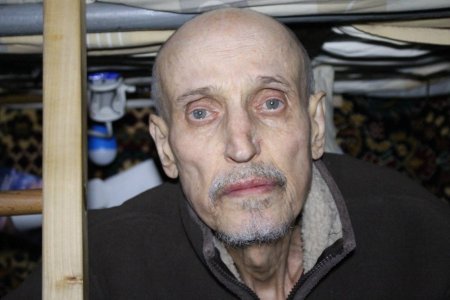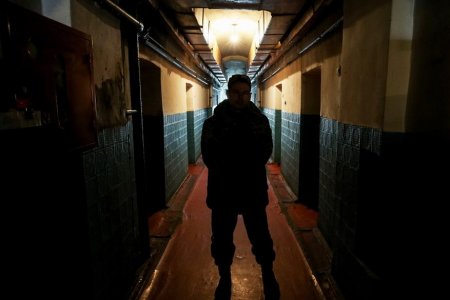![© Bumble Dee/Shutterstock [армія військовий]](https://khpg.org/files/img/1608819481.jpg)
The explanatory note to the draft law says: “Considering the difficult situation in connection with the invasion of Ukraine by the Russian Federation and the introduction of martial law throughout Ukraine, there is an urgent need to reman the Ukrainian army and other military formations quickly. In this regard, it is proposed to allow persons already serving their sentences and about to be sentenced to apply to the prosecutor for further conscription of such persons for military service during mobilization.” The bill’s authors propose granting an amnesty to citizens serving a sentence who have expressed a desire to serve in the military and are fit for it.
Prisoners and the war
When the Russian full-scale invasion began, many convicts and prisoners expressed a desire to defend Ukraine. In March 2022, the President signed the Law of Ukraine “On Amendments to the Criminal Procedure Code of Ukraine Concerning Procedure for Cancellation of a Measure of Restraint for Conscription during Mobilization, for a Special Period or its Change on Other Grounds.” According to the law, suspects and accused persons held in custody during pre-trial investigation or trial have the right to apply to the prosecutor requesting to cancel this preventive measure in order to conscript during the war. Persons suspected of committing crimes against the foundations of Ukraine’s national security and particularly grave crimes are excluded.
However, some convicts were also sent to the front using the procedure of presidential pardon. It covered primarily those people who already had military experience.
The story of Mena Penal Colony No. 91 is illustrative. At the beginning of the big-scale war, the institution’s administration allowed prisoners ready to defend the state to leave the colony and join the ranks of the local Territorial Defense. Later, 44 persons directly involved in the hostilities were pardoned by the President of Ukraine and remained in the AFU military units. The others were returned to the institution despite their requests to be released to participate in combat operations.
What does the draft law No. 10419 propose?
The bill’s authors propose to exempt from serving a prison sentence and other non-custodial punishments persons found guilty of committing negligent or intentional crimes that are not particularly grave according to Article 12 of the Criminal Code of Ukraine, as well as persons whose criminal cases were considered by courts but whose sentences have not entered into force. If the law is passed, amnesty will be granted only to those willing to go to the frontline, are subject to conscription during mobilization, and are fit for military service by health and age. Such a person must report for conscription within 24 hours after release.
The range of prisoners who cannot be mobilized is quite broad. The bill proposes to exclude from amnesty the following persons:
- Who have had their death sentence commuted to imprisonment by way of pardon, and those sentenced to life imprisonment;
- Who have two or more convictions for intentional grave and/or especially grave crimes, except in cases of individual amnesty;
- Who was convicted of crimes against the foundations of Ukraine’s national security, terrorist acts, banditry, and aggravated murder;
- Who was convicted of a crime or crimes that resulted in the death of two or more persons;
- Who have been granted amnesty or pardon within the last ten years, regardless of the removal or expungement of their conviction, and who have committed an intentional criminal offense again;
- Who was convicted of deliberate murder, torture, forced human organ donation, illegal imprisonment or abduction of a person, if death was caused, or serious bodily harm that resulted in death;
- Who, after being sentenced but before serving their complete sentence, have again committed an intentional crime;
- Who was previously released from prison on parole and again committed an intentional grave or especially grave crime;
- Who has been released by a court from serving a sentence with probation and, before the end of the probationary period determined by the court, have again committed a deliberate grave or especially grave crime;
- Who have children under the age of 18, disabled children and/or adult sons and daughters recognized as disabled, and have committed crimes that infringe on the life, health, honor, dignity, or other rights and interests of these children protected by law;
- Who was convicted of intentional crimes that resulted in the death of two or more people;
- Who have one or both parents over the age of 70 or recognized as disabled persons of the first group and have committed crimes that infringe on the life, health, honor, dignity, or other rights and interests of these parents protected by law;
- Who has committed or been convicted of crimes against the foundations of Ukraine’s national security, as well as crimes under Articles 115, 146-147, 152-156, 186, 187, 189, 255, 255-1, 257, 258-262, 305-321, 330, 335-337, 401-414, 426-433, 436, 437-442 of the Criminal Code of Ukraine.
According to the bill’s authors, the decision to grant amnesty will be made by the court and initiated, depending on the specific case, by prosecutors, the person, their defense counsel or legal representative, the administration of the penitentiary institution, and the command of the disciplinary battalion.
As long as the war continues, the amnestied person will be able to be demobilized only by the conclusion of the military medical commission “on unfitness for military service with exclusion from military registration or on unfitness for military service with re-examination in 6-12 months as a result of being wounded during a combat or service mission due to the actions of an external factor or enemy actions.”
Pros and cons
This highly complex issue requires careful analysis of its ethical, legal, and social aspects.
On the one hand, the mobilization of convicts can contribute to their resocialization and reintegration into society. Military service can reduce the likelihood of reoffending and help restore social ties. Conscription of prisoners to the army can benefit society economically. This may be especially relevant in the context of prison overcrowding, reducing the financial pressure on the penal system. Participation in the defense of our state can help foster a sense of responsibility and self-esteem among convicts. This can positively impact their behavior and outlook on life in the future.
On the other hand, the involvement of convicts in military actions may violate their rights, as the authorities fully control them and can use them as “consumables” without appropriate protection of their rights and guarantees. In addition, the mobilization of convicts may increase their social stigmatization, which will complicate their further reintegration into society. Most importantly, inadequate supervision of convicts during military operations can lead to various problems, including their possible out-of-control behavior and conflicts with civilians and fellow combatants.
It should be noted that social acceptance and support of the society of this legislative novelty are essential factors for its successful implementation. There is a high level of motivation among convicted persons to participate in the defense of the state because some convicts can perceive military service as a kind of redemption for their crimes.
The mobilization of convicts is a complex and controversial approach to the use of human resources. Although it may have advantages, it is necessary to consider possible adverse consequences carefully. We believe that in the future, the possible mobilization of convicts on the condition of carefully considering each case’s specific circumstances and features may help Ukrainian citizens fulfill their constitutional duty.
The material was prepared as a part of the UHHRU reception’s work.



